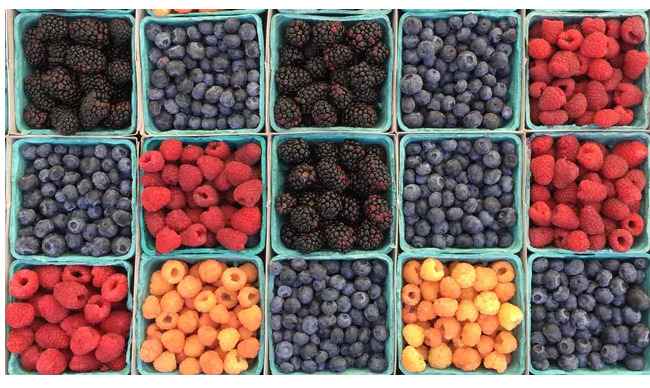5 best foods to ease hay fever symptoms, revealed

Ahh-choo-se these foods wisely…
Your diet can affect everything from your mood to your health and, according to nutritionist Michele Chevalley Hedge, it may even relieve your seasonal allergies, too. Here, she explains which foods to reach for (and which ones to avoid).
The arrival of spring may herald warmer, drier days (La Niña willing), but for more than 4.6 million Australians, it also marks the beginning of hay fever season.
Also known as allergic rhinitis, hay fever is often triggered by an influx of environmental allergens such as pollen from grass and trees, as well as dust mites and pet dander.
Hay fever usually results in watery, irritated eyes, sneezing and a blocked or runny nose – and while certain medications (such as antihistamines) can help to manage your symptoms, your diet may also help.
“Food can ease our immune response and inflammation in abundance,” nutritionist Michele Chevalley Hedge tells Body+Soul. “Foods that are rich in flavonoids, such as quercetin, vitamin C and/or beta-carotene, can help to reduce histamine and lower inflammation.”
Here are five that may help.
Ginger
“This humble root slows down histamine production by reducing our levels of immunoglobulin E [antibodies produced in response to an allergy],” Chevalley Hedge explains.
“It’s easy to consume in a tea or grated into soups, salads or curries.”
Garlic
According to Chevalley Hedge, garlic is “an excellent source of quercetin as well as vitamin C”.
These are both powerful antioxidants and have been shown to have effective antihistamine effects.
Red and brown onions
These flavourful vegetables are chock-full of antioxidants (in fact, they contain more than 25 varieties of flavonoid antioxidants ) as well as quercetin, which can help to reduce hay fever symptoms.
A study in the journal Molecules also found that they can help prevent certain cells from reacting to allergens. “Onions will retain their goodness either raw or sautéed at low to medium temperatures,” Chevalley Hedge tips.
Herbal teas
“Nettle tea contains a natural antihistamine and can ease pollen allergy symptoms,” Chevalley Hedge tells Body+Soul.
“Butterbur tea is often used [to ease] seasonal allergies and studies show it is as effective as a top-selling over-the-counter antihistamine.”
Green tea may also help reduce hay fever symptoms, although Chevalley Hedge notes that the Camellia sinensis variety is the most effective. You may want to avoid chamomile tea, she adds, as it is related to ragweed, a known seasonal allergen.
Berries
“Strawberries, blueberries and raspberries are high in vitamin C and quercetin, and low in sugar,” explains Chevalley Hedge. “And they are great for your memory and motor performance, as well.”
The triggers to avoid
Nutritionist Michele Chevalley Hedge explains which foods may be exacerbating your hay fever symptoms this spring
Fermented or aged goods
Kimchi, kombucha, yoghurt and sauerkraut have been shown to contain high levels of histamine, which can trigger hay fever.
Processed meats
Packaged, smoked or preserved meats may ignite allergies. A lot of fresh meat products are fine, but some studies show grilled meats can increase your histamine profile.
Alcohol
In my clinic, the biggest trigger for hay fever I see is alcohol. This is from a reaction to the sulphites [and] certain grains, which can wreak havoc on a person [who is intolerant].
Chocolate
Some types of chocolate are high in histamines. While I would not advise anyone to avoid antioxidant-rich, quality dark chocolate, if you suffer from hay fever then perhaps assess how you feel after eating it.
Michele Chevalley Hedge is a nutritional medicine practitioner, founder of the wellness website A Healthy View and author of Eat Drink & Still Shrink.
Categories
- A Healthy View (507)
- Breakfast Recipes (22)
- Chicken Dinner Recipes (29)
- Chilli Recipes (5)
- Christmas Recipes (14)
- Curry Recipes (8)
- Dessert Recipes (20)
- Dinner Recipes (113)
- Easter Recipes (9)
- Energy & Vitality (4)
- Free Recipes (232)
- Gut Health (11)
- Hormone Health (17)
- Media (86)
- Mental Health (30)
- Mexican Recipes (11)
- Nutrition (204)
- Productivity (5)
- Salad Recipes (9)
- Sauce & Dip Recipes (12)
- Seafood Recipes (12)
- Sleep (7)
- Soup Recipes (12)
- Snack Recipes (56)
- Stress (2)
- Sugar (13)
- Weight Loss (36)
- Workplace Wellbeing (26)
- Brain Health (3)
- energy (1)
- calories (1)

Michele Chevalley Hedge is a qualified Nutritional Medicine Practitioner, speaker, and best-selling author has delivered 600+ keynotes for leading global brands, including Microsoft, Accenture, American Express, Apple, ANZ, CBRE, the Australian Government, and more.
Michele’s nutrition retreats, wellness courses, books, articles, and corporate health programs are backed by peer-reviewed research on workplace well-being, nutrition, stress, and mental health. A regular guest on Channel 7, Sunrise, and The Today Show and contributor to The Sydney Morning Herald, Body & Soul, and The Daily Mail, Michele is also an Ambassador for Cure Cancer and the Heart Research Institute.


0 comments
Leave a comment
Please log in or register to post a comment